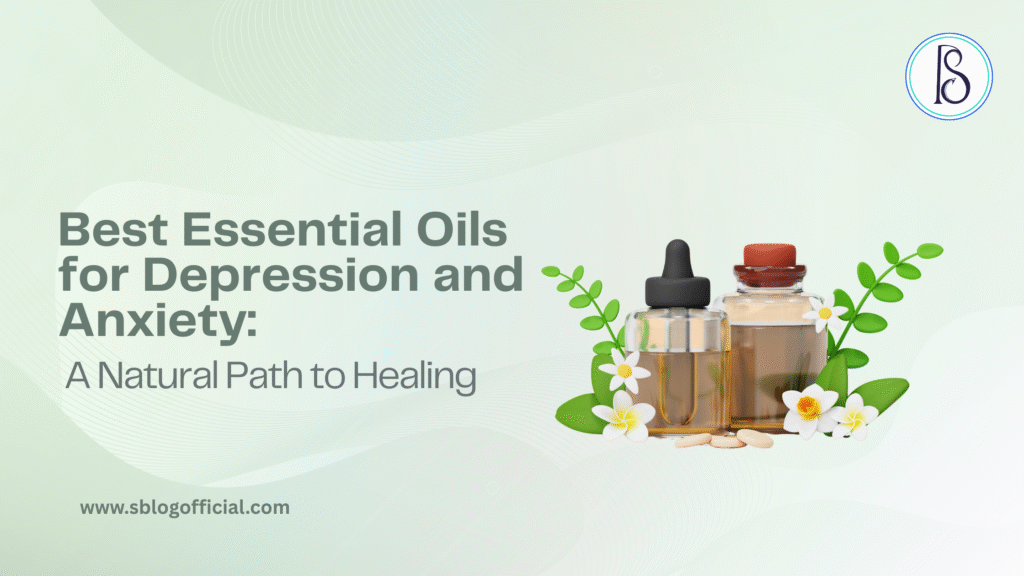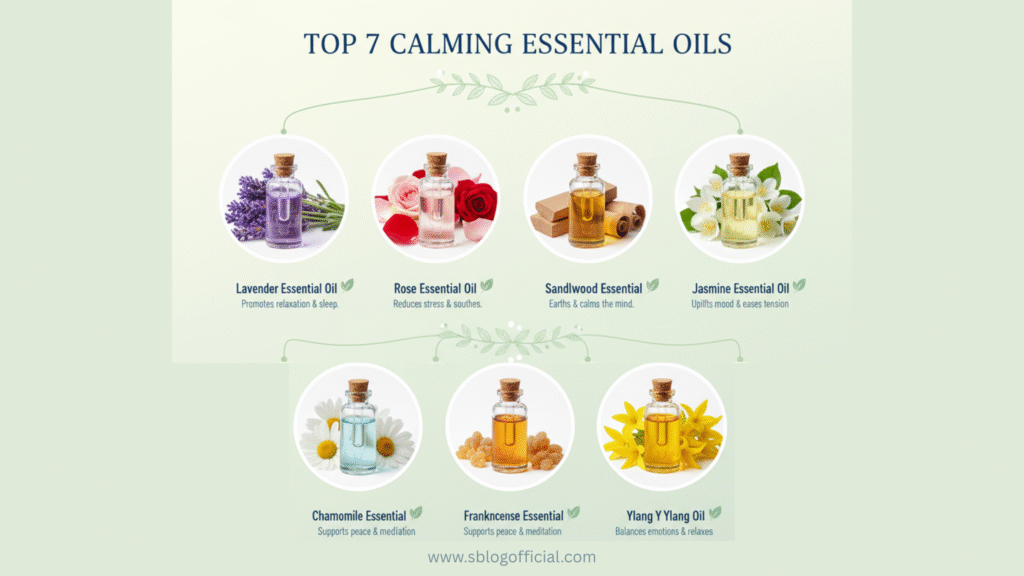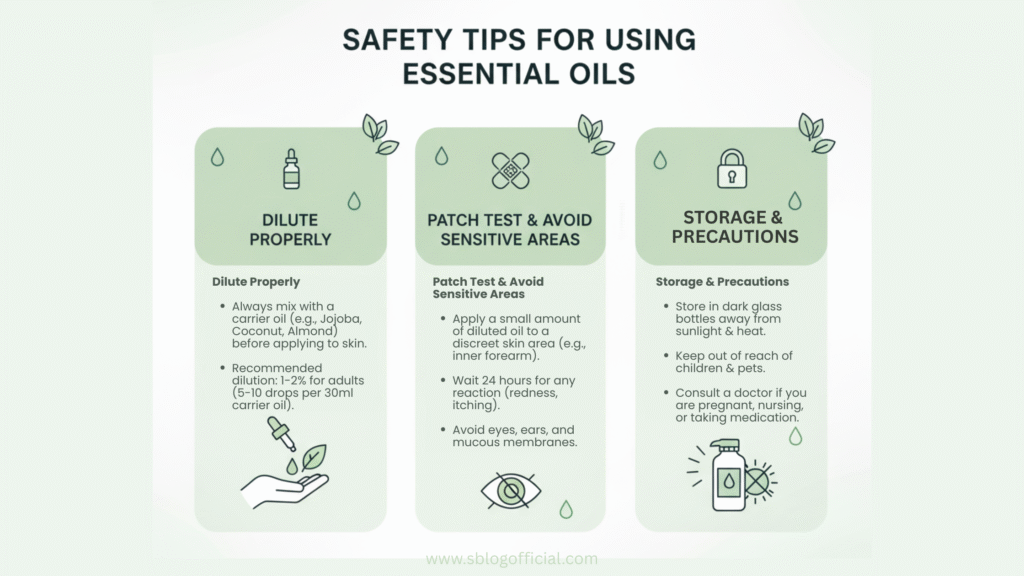
In a world that’s moving faster every day, stress, anxiety, and depression have unfortunately become common struggles. While modern medicine offers various treatments, many people are turning toward natural remedies to complement their healing journey. Among these, essential oils have gained immense popularity for their soothing, mood-lifting, and balancing effects.
This article examines the most effective essential oils for depression and anxiety, their traditional roots in Ayurveda, and offers practical tips on incorporating essential oils into your home care routine. We’ll also explore various uses for scented oils, allowing you to naturally bring calm and balance into your daily life.
Understanding Essential Oils and Mental Health
Essential oils are concentrated plant extracts obtained through distillation or cold pressing. They capture the plant’s natural fragrance and healing properties, which can positively influence both the mind and body.
From an Ayurvedic perspective, mental disturbances such as depression and anxiety are often linked to an imbalance in the doshas—primarily Vata (restlessness, fear, worry) and Kapha (heaviness, lethargy, sadness). Essential oils, when chosen wisely, can help balance these doshas and restore mental clarity, peace, and emotional strength.
Also- what herbs have the most health benefits | Potent Remedies
Best Essential Oils for Depression and Anxiety
When it comes to emotional well-being, certain essential oils stand out for their proven calming and uplifting effects. Let’s look at the best essential oils for depression and anxiety:

1. Lavender Essential Oil
- Why it works: Lavender is perhaps the most famous oil for stress relief. Its calming aroma helps reduce anxiety, promotes relaxation, and improves sleep quality.
- Ayurvedic touch: Balances aggravated Vata dosha, calming restlessness and nervous tension.
- How to use: Add a few drops to your pillow before bedtime or diffuse it in your bedroom.
2. Rose Essential Oil
- Why it works: Rose oil is known for its ability to uplift mood, reduce feelings of sadness, and promote emotional balance.
- Ayurvedic touch: Pacifies both Pitta (anger, irritability) and Kapha (emotional heaviness).
- How to use: Mix a few drops with a carrier oil and apply to your wrists or behind your ears for an instant lift.
3. Sandalwood Essential Oil
- Why it works: A grounding oil that helps reduce stress, quiet the mind, and improve focus.
- Ayurvedic touch: Traditionally used in Ayurveda for meditation, it balances Pitta and enhances mental clarity.
- How to use: Diffuse during yoga or meditation for deep relaxation.
4. Jasmine Essential Oil
- Why it works: Jasmine oil is uplifting and helps reduce symptoms of anxiety and mild depression. Its floral scent boosts confidence and optimism.
- Ayurvedic touch: Supports emotional healing and harmonizes the heart chakra, making it ideal for reducing sadness.
- How to use: Add a few drops to your bathwater for a calming, mood-enhancing soak.
5. Chamomile Essential Oil
- Why it works: Chamomile is well-known for its ability to calm the mind and soothe irritability. It also improves sleep quality.
- Ayurvedic touch: Balances Vata dosha, especially when anxiety is linked to overthinking and insomnia.
- How to use: Blend with a carrier oil and massage your temples before bed.
6. Frankincense Essential Oil
- Why it works: Frankincense has been used in spiritual practices for centuries. It eases stress, deepens breathing, and encourages mindfulness.
- Ayurvedic touch: Known for enhancing meditation and balancing all three doshas, especially when the mind is clouded with negativity.
- How to use: Diffuse during meditation or add to warm bathwater.
7. Ylang Ylang Essential Oil
- Why it works: With its exotic floral scent, Ylang Ylang reduces tension, lowers stress, and enhances feelings of joy.
- Ayurvedic touch: Balances excessive Pitta by cooling anger and irritability while also energizing low Kapha states.
- How to use: Add a few drops to coconut oil and massage your feet before sleep.
Also Read- Which is the Best Strategy for Avoiding Chronic Diseases Caused by a High-Calorie Diet?
Essential Oils at Home: Creating Your Personal Healing Space
One of the most beautiful things about essential oils is that you don’t need a professional spa to enjoy their benefits. With just a few drops, you can transform your home into a sanctuary of peace and balance. Using essential oils at home helps you weave healing into your everyday routine, making wellness simple, natural, and accessible.
Here are some powerful ways to use them in daily life:
1. Diffusion for a Calm Environment
Using a diffuser is one of the easiest ways to fill your living space with calming aromas. Essential oils like lavender, sandalwood, or frankincense create a serene atmosphere, reducing stress and encouraging mindfulness. Diffusion can also purify indoor air and uplift your mood.
- Ayurvedic Insight: Diffusing oils balances disturbed Vata dosha, which is often responsible for anxiety and overthinking.
2. Massage and Self-Care Rituals (Abhyanga)
Mixing essential oils with a base like sesame, coconut, or almond oil can turn your daily self-massage into a deeply therapeutic ritual. For example, lavender or chamomile oil added to warm sesame oil helps relax the nervous system, ease muscle tension, and promote sound sleep.
- Ayurvedic Insight: Abhyanga (oil massage) is a traditional practice that nourishes the skin, calms the mind, and balances all three doshas. Adding essential oils makes this practice more personalized for emotional healing.
3. Aromatic Baths
A warm bath infused with a few drops of rose, jasmine, or ylang ylang oil can soothe frazzled nerves and uplift your spirit. This practice not only calms the mind but also softens the skin and induces relaxation.
- Ayurvedic Insight: Water (Jala Mahabhuta) is naturally calming. Combining it with essential oils helps reduce Pitta irritability and Vata restlessness.
4. Inhalation for Instant Calm
Sometimes anxiety hits suddenly—before an exam, meeting, or presentation. In such cases, simply inhaling an essential oil directly from a tissue or inhaler stick can help ground your emotions. Oils like frankincense, sandalwood, or peppermint are excellent for quick relief.
- Ayurvedic Insight: Direct inhalation works quickly to stabilize Prana Vata, the subtle energy of the nervous system.
5. Pillow, Room, or Linen Spray
Create your own spray by mixing a few drops of lavender or chamomile with distilled water. Spritz it on pillows or in your bedroom to promote restful sleep. For daytime energy, citrus oils like orange or lemon can make your living space feel fresh and lively.
- Ayurvedic Insight: This simple ritual is a way of bringing “Sattva” (clarity, purity, and peace) into your environment.
6. Everyday Mindfulness Practices
You can incorporate essential oils into yoga, pranayama (breathwork), or meditation. For instance, diffusing sandalwood during meditation deepens concentration, while frankincense enhances spiritual connection.
- Ayurvedic Insight: Essential oils support the subtle body by harmonizing the chakras and calming the mind, making spiritual practices more powerful.
Also read- Supercharging T Cells: The Key to Stronger Immunity
Scented Oil Uses Beyond Aromatherapy
While aromatherapy is the most common method, scented oil uses extend into everyday life. Here are some versatile ways to enjoy them:
- Skincare: Oils like rose, chamomile, and sandalwood are used in Ayurvedic skincare for calming inflamed skin.
- Haircare: Jasmine and lavender oils are added to hair oils to reduce stress and improve scalp health.
- Meditation: Frankincense and sandalwood enhance spiritual practices, helping the mind focus.
- Household freshness: Citrus oils like orange or lemon lift mood and cleanse the air.
Also Read- Mastering Your Calm: A Friendly Guide to Positive Stress Management Techniques
Ayurveda’s Perspective on Essential Oils for Mental Wellness
Ayurveda teaches that the mind, body, and spirit are deeply interconnected. Essential oils work not only on the physical level but also on the subtle energetic level, helping to restore harmony.
- For Vata imbalance (restlessness, worry, insomnia): Lavender, chamomile, sandalwood.
- For Pitta imbalance (anger, irritability, frustration): Rose, ylang ylang, sandalwood.
- For Kapha imbalance (sadness, lethargy, depression): Frankincense, jasmine, citrus oils.
Daily self-care rituals in Ayurveda, such as Abhyanga (oil massage), can be enhanced by adding calming essential oils, turning a simple routine into a therapeutic practice for both body and mind.
Safety Tips for Using Essential Oils
While essential oils are powerful natural remedies, they must be used carefully:

- Always dilute essential oils with a carrier oil before applying to skin.
- Conduct a patch test to check for allergies.
- Pregnant or breastfeeding women should consult a healthcare provider before use.
- Never ingest essential oils unless under professional guidance.
Final Thoughts
The best essential oils for depression and anxiety offer a natural, holistic way to support emotional well-being. Whether diffused in the air, added to a warm bath, or massaged into the skin, these oils help calm the mind, uplift the spirit, and bring balance back into life.
By blending the wisdom of Ayurveda with modern aromatherapy practices, essential oils can become more than just pleasant fragrances, they can be powerful allies in your healing journey.
